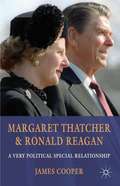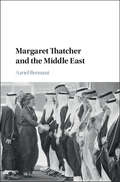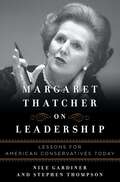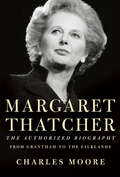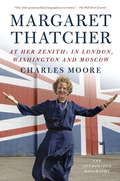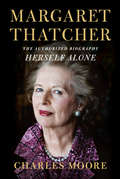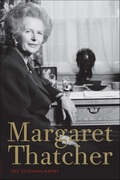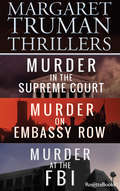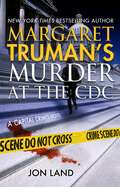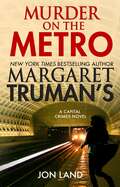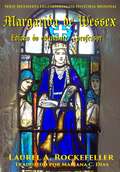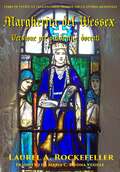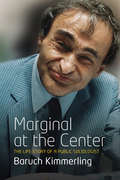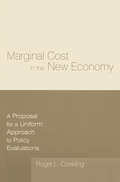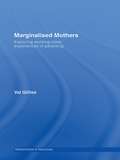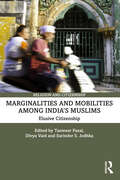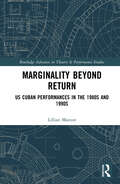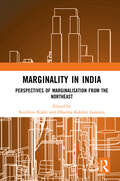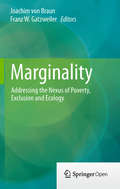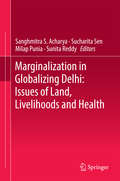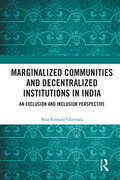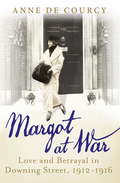- Table View
- List View
Margaret Thatcher and Ronald Reagan
by James CooperA new exploration of the relationship between the Margaret Thatcher and Ronald Reagan administrations in domestic policy. Using recently released documentary material and extensive research interviews, James Cooper demonstrates how specific policy transfer between these 'political soul mates' was more limited than is typically assumed.
Margaret Thatcher and the Middle East
by Azriel BermantMargaret Thatcher and the Middle East examines Thatcher's policy on the Middle East, with a spotlight on her approach towards the Israeli-Palestinian conflict. It questions claims that she sought to counter the Foreign Office Middle East policy, and maintains that the prime minister was actually in close agreement with the Whitehall bureaucracy on the Arab-Israeli conflict. In particular, the volume argues that Thatcher's concerns over Soviet ambitions in the Middle East encouraged her to oppose the policies of Israel's Likud governments, and to work actively for an urgent resolution of the conflict. Furthermore, while Thatcher was strongly pro-American, this was not translated into automatic support for Israel. Indeed, the Thatcher government was very much at odds with the Reagan administration over the Middle East, as a result of Washington's neglect of the forces of moderation in the region.
Margaret Thatcher on Leadership: Lessons for American Conservatives Today
by Stephen Thompson Nile GardinerThis inspirational and practical guide for conservatives combines stories from Lady Thatcher's life with principles and strategies conservatives can apply to their challenges today. Nile Gardiner and Stephen Thompson outline the critical lessons conservatives can learn from Lady Thatcher on articulating conservative principles to a broader audience, cutting through bureaucratic messes to achieve goals, and standing up to aggressive regimes.
Margaret Thatcher: From Grantham to the Falklands
by Charles MooreWith unequaled authority and dramatic detail, the first volume of Charles Moore's authorized biography of Margaret Thatcher reveals as never before the early life, rise to power, and first years as prime minister of the woman who transformed Britain and the world in the late twentieth century. Moore has had unique access to all of Thatcher's private and governmental papers, and interviewed her and her family extensively for this book. Many of her former colleagues and intimates have also shared previously unseen papers, diaries, and letters, and spoken frankly to him, knowing that what they revealed would not be published until after her death. The book immediately supersedes all other biographies and sheds much new light on the whole spectrum of British political life from Thatcher's entry into Parliament in 1959 to what was arguably the zenith of her power--victory in the Falklands in 1982. Drawing on an extraordinary cache of letters to her sister Muriel, Moore illuminates Thatcher's youth, her relationship with her parents, and her early romantic attachments, including her first encounters with Denis Thatcher and their courtship and marriage. Moore brilliantly depicts her determination and boldness from the very beginning of her political career and gives the fullest account of her wresting the Tory leadership from former prime minister Edward Heath at a moment when no senior figure in the party dared to challenge him. His account of Thatcher's dramatic relationship with Ronald Reagan is riveting. This book also explores in compelling detail the obstacles and indignities that Thatcher encountered as a woman in what was still overwhelmingly a man's world. Moore's admiration for Thatcher is evident, yet his portrait is convincingly clear-eyed, conveying both how remarkable she was and how infuriating she could be, her extraordinary grasp at mastering policy and what needed to be done, and her surprising vulnerabilities. At the moment when Margaret Thatcher becomes a part of history, Moore's portrait enlivens her, compellingly re-creating the circumstances and experiences that shaped one of the most significant world leaders of the postwar era.
Margaret Thatcher: In London, Washington and Moscow (Authorized Biography of Margaret Thatcher)
by Charles MooreIn June 1983 Margaret Thatcher won the biggest increase in a government's parliamentary majority in British electoral history. Over the next four years, as Charles Moore relates in this central volume of his uniquely authoritative biography, Britain's first woman prime minister changed the course of her country's history and that of the world, often by sheer force of will. The book reveals as never before how Mrs. Thatcher transformed relations with Europe, privatized the commanding heights of British industry and continued the reinvigoration of the British economy. It describes her role on the world stage with dramatic immediacy, identifying Mikhail Gorbachev as "a man to do business with" before he became leader of the Soviet Union, and then persistently pushing him and Ronald Reagan, her great ideological soul mate, to order world affairs according to her vision. For the only time since Churchill, she ensured that Britain had a central place in dealings between the superpowers. But even at her zenith she was beset by difficulties. Reagan would deceive her during the U.S. invasion of Grenada. She lost the minister to whom she was personally closest to scandal and faced calls for her resignation. She found herself isolated within her own government. She was at odds with the Queen over the Commonwealth and South Africa. She bullied senior colleagues and she set in motion the poll tax. Both these last would later return to wound her, fatally. Charles Moore has had unprecedented access to all of Mrs. Thatcher's private and government papers. The participants in the events described have been so frank in interviews that we feel we are eavesdropping on their conversations as they pass. We look over Mrs. Thatcher's shoulder as she vigorously annotates documents and as she articulates her views in detail, and we understand for the first time how closely she relied on a handful of trusted advisers to carry out her will. We see her as a public performer, an often anxious mother, a workaholic and the first woman in Western democratic history who truly came to dominate her country in her time. In the early hours of October 12, 1984, during the Conservative party conference in Brighton, the IRA attempted to assassinate her. She carried on within hours to give her leader's speech at the conference. One of her many left-wing critics, watching her that day, said, "I don't approve of her as Prime Minister, but by God she's a great tank commander." This titanic figure, with all her capabilities and her flaws, storms from these pages as from no other book.From the Hardcover edition.
Margaret Thatcher: The Authorized Biography: Herself Alone
by Charles MooreCharles Moore's masterful and definitive biography of Britain's first female prime minister reaches its climax with the story of her zenith and her fall.How did Margaret Thatcher change and divide Britain? How did her model of combative female leadership help shape the way we live now? How did the woman who won the Cold War and three general elections in succession find herself pushed out by her own MPs?Charles Moore's full account, based on unique access to Margaret Thatcher herself, her papers, and her closest associates, tells the story of her last period in office, her combative retirement, and the controversy that surrounded her even in death. It includes the fall of the Berlin Wall, which she had fought for, and the rise of the modern EU that she feared. It lays bare her growing quarrels with colleagues and reveals the truth about her political assassination.Moore's three-part biography of Britain's most important peacetime prime minister paints an intimate political and personal portrait of the victories and defeats, the iron will but surprising vulnerability of the woman who dominated in an age of male power. This is the full, enthralling story.
Margaret Thatcher: The Autobiography
by Margaret ThatcherPublished in a single volume for the first time, Margaret Thatcher is the story of her remarkable life told in her own words--the definitive account of an extraordinary woman and consummate politician, bringing together her bestselling memoirs The Downing Street Years and The Path to Power. Margaret Thatcher is the towering political figure of late-twentieth-century Great Britain. No other prime minister in modern times sought to change the British nation and its place in the world as radically as she did.Writing candidly about her upbringing and early years and the formation of her character and values, she details the experiences that propelled her to the very top in a man's world. She offers a riveting firsthand history of the major events, the crises and triumphs, during her eleven years as prime minister, including the Falklands War, the Brighton hotel bombing, the Westland affair, the final years of the Cold War, and her unprecedented three election victories. Thatcher's judgments of the men and women she encountered during her time in power-from statesmen, premiers, and presidents to Cabinet colleagues-are astonishingly frank, and she recalls her dramatic final days in office with a gripping, hour-by-hour description from inside 10 Downing Street. Powerful, candid, and compelling, Margaret Thatcher stands as a testament to a great leader's significant legacy.
Margaret Truman Thrillers: Murder in the Supreme Court, Murder on Embassy Row, Murder at the FBI (Capital Crimes)
by Margaret TrumanThese three political thrillers by the acclaimed author—and daughter of President Harry Truman—offer an insider&’s look into the dangerous shadows of D.C.Murder in the Supreme Court When Clarence Sutherland, Chief Clerk of the Supreme Court, is found dead, Lieutenant Martin Teller of the Washington Police and Susanna Pincher of the Justice Department are pulled together to find the killer.Murder on Embassy Road When a British Ambassador drops dead at his own gala, everyone suspects his Iranian valet—who has suddenly disappeared. But knowing the Ambassador&’s reputation for womanizing and shady financial deals, Washington Metro&’s Captain Sal Morizio digs deeper.Murder at the FBI FBI Agents Ross Lizenby and Christine Saksis are in a showdown with their own Bureau when they investigate the murder of a fellow agent at the J. Edgar Hoover Building. While the higher-ups want the case closed quickly, the trail leads to disturbing secrets among them.
Margaret Truman's Murder at the CDC: A Capital Crimes Novel (Capital Crimes #31)
by Margaret Truman Jon LandMurder and intrigue on the steps of the United States capital building pulls Robert Brixton into his most personal case yet, in Margaret Truman's Murder at the CDC2017: A military transport on a secret run to dispose of its deadly contents vanishes without a trace.The present: A mass shooting on the steps of the Capitol nearly claims the life of Robert Brixton’s grandson.No stranger to high-stakes investigations, Brixton embarks on a trail to uncover the motive behind the shooting. On the way he finds himself probing the attempted murder of the daughter his best friend, who works at the Washington offices of the CDC.The connection between the mass shooting and Alexandra’s poisoning lies in that long-lost military transport that has been recovered by forces determined to change America forever. Those forces are led by radical separatist leader Deacon Frank Wilhyte, whose goal is nothing short of bringing on a second Civil War.Brixton joins forces with Kelly Lofton, a former Baltimore homicide detective. She has her own reasons for wanting to find the truth behind the shooting on the Capitol steps, and is the only person with the direct knowledge Brixton needs. But chasing the truth places them in the cross-hairs of both Wilhyte’s legions and his Washington enablers.At the Publisher's request, this title is being sold without Digital Rights Management Software (DRM) applied.
Margaret Truman's Murder on the Metro: A Capital Crimes Novel (Capital Crimes #31)
by Margaret Truman Jon LandIn Margaret Truman's Murder on the Metro, Jon Land's first thrilling addition to the New York Times bestselling Capital Crimes series, Robert Brixton uncovers a sinister plot threatening millions of American lives!"A roller coaster of a novel." —David Baldacci, New York Times bestselling authorIsrael: A drone-based terrorist attack kills dozens on a sun-splashed beach in Caesarea.Washington: America awakens to the shattering news that Vice President Stephanie Davenport has died of an apparent heart attack.That same morning, a chance encounter on the Washington Metro results in international private investigator Robert Brixton thwarting an attempted terrorist bombing. Brixton has no reason to suspect that the three incidents have anything in common, until he’s contacted by Kendra Rendine, the Secret Service agent who headed up the vice president’s security detail. Rendine is convinced the vice president was murdered and needs Brixton’s investigative expertise to find out why. In Israel, meanwhile, legendary anti-terrorist fighter Lia Ganz launches her own crusade against the perpetrators of that attack which nearly claimed the lives of her and granddaughter. Ganz’s trail will ultimately take her to Washington where she joins forces with Brixton to uncover an impossible link between the deadly attack on Caesarea and the attempted Metro bombing, as well as the death of the vice president. The connection lies in the highest corridors of power in Washington where a deadly plot with unimaginable consequences has been hatched. With the clock ticking toward doomsday, Brixton and Ganz race against time to save millions of American lives who will otherwise become collateral damage to a conspiracy destined to change the United States forever."Margaret Truman’s Murder in the Metro is a spectacular international thriller of intrigue and conspiracy that I could . . . not . . . put . . . down." —Mark Greaney, New York Times bestselling authorAt the Publisher's request, this title is being sold without Digital Rights Management Software (DRM) applied.
Margarida de Wessex: Edição do estudante-professor (Mulheres Legendárias da História — Livros de Estudo #10)
by Laurel A. RockefellerA história inspiradora de Margarida de Wessex, rainha consorte de Malcolm III Canmore de Alba, ganha vida nessa edição especial do estudante-professor —planejada para ser usada em escolas e em casa. Perguntas que induzem a compreensão da leitura, lógica e pensamento crítico se unem ao aprendizado de história para criar uma adição robusta, mas acessível, ou um ponto de referência, para aulas de estudos sociais. Apêndices no fim do livro fornecem informações que são referências-chaves, incluindo uma linha do tempo detalhada cobrindo 3.000 anos de história da Escócia. Unidades de tempo medievais são tanto explicadas nos apêndices quando aplicadas na narrativa. Um material essencial para todos os cursos de estudos sociais. Para idades 12+.
Margherita del Wessex: Versione per studenti e docenti (Le leggendarie donne della storia mondiale #10)
by Laurel A. RockefellerLa storia entusiasmante di Margherita del Wessex, moglie di Malcolm III Canmore, re del regno di Alba, prende vita in questa edizione per studenti e docenti appositamente creata per l’uso in aula e a casa. Le domande si prefiggono lo scopo di favorire la comprensione del testo ed il pensiero logico durante l’apprendimento della storia. In coda al testo vengono fornite appendici relative alla computazione del tempo in epoca medievale ed una dettagliatissima cronologia della storia scozzese che comprende eventi accaduti nell’arco di circa 3000 anni. Questo libro è uno strumento indispensabile nell’ampliamento della conoscenza storica. Adatto ad un pubblico dai 12 anni in poi.
Marginal At The Center: The Life Story of a Public Sociologist
by Baruch KimmerlingA self-proclaimed guerrilla fighter for ideas, Baruch Kimmerling was an outspoken critic, a prolific writer, and a "public" sociologist. While he lived at the center of the Israeli society in which he was involved as both a scientist and a concerned citizen, he nevertheless felt marginal because of his unconventional worldview, his empathy for the oppressed, and his exceptional sense of universal justice, which were at odds with prevailing views. In this autobiography, the author, who was born in Transylvania in 1939 with cerebral palsy, describes how he and his family escaped the Nazis and the circumstances that brought them to Israel, the development of his understanding of Israeli and Palestinian histories, of the narratives each society tells itself, and of the implacable "situation"--along with predictions of some of the most disturbing developments that are taking place right now as well as solutions he hoped were still possible. Kimmerling's deep concern for Israel's well-being, peace, and success also reveals that he was in effect a devoted Zionist, contrary to the claims of his detractors. He dreamed of a genuinely democratic Israel, a country able to embrace all of its citizens without discrimination and to adopt peace as its most important objective. It is to this dream that this posthumous translation from Hebrew has been dedicated.
Marginal Cost in the New Economy: A Proposal for a Uniform Approach to Policy Evaluations
by Roger L. ConklingThis volume presents an approach for resolving a variety of public policy debates. It proposes that a single standard - marginal cost methodology - be adopted to replace the haphazard arrays of methods and techniques currenly employed to measure the costs and benefits of disputed policy issues.
Marginalised Mothers: Exploring Working Class Experiences of Parenting (Relationships and Resources)
by Val GilliesSuccessive moral panics have cast poor or socially excluded mothers - associated with social problems as diverse as crime, underachievement, unemployment and mental illness - as bad mothers. Their mothering practices are held up as the antithesis of good parenting and are associated with poor outcomes for children. Marginalised Mothers provides a detailed and much-needed insight into the lived experience of mothers who are frequently the focus of public concern and intervention, yet all too often have their voices and experiences overlooked. The book explores how they make sense of their lives with their children and families, position themselves within a context of inequality and vulnerability, and resist, subvert and survive material and social marginalisation. This controversial text uses qualitative data from a selection of working class mothers to highlight the opportunities and choices they face and to expose the middle class assumptions that ground much contemporary family policy. It will be of interest to students and researchers in sociology, social work and social policy, as well as social workers and policymakers.
Marginalities and Mobilities among India’s Muslims: Elusive Citizenship (Religion and Citizenship)
by Surinder S. Jodhka Tanweer Fazal Divya VaidThis book studies how marginality impacts the everyday lives of Indian Muslims. It challenges the prevailing myths and stereotypes through which Indian Muslims have come to be seen in the popular imagination. The volume engages with questions of citizenship, collective violence, and issues of civil and criminal jurisprudence. It explores the linkages between development, marginality, and citizenship – the three critical issues for modern democracies today. Going beyond the singular narrative of a community on a continuous slide, the chapters in this volume present diversities of the Muslim experience of exclusion and participation. It discusses themes such as violence and marginality among minorities; Indian Muslims and the ghettoized economy; employment aspirations of low-income Muslim men; intergenerational social mobility of Muslims; the nature of the middle class; and the question of Islam, development, and globalization to showcase the living conditions of Muslims in India. Part of the Religion and Citizenship series, this timely volume will be an essential read for scholars and researchers of political studies, sociology, political sociology, minority studies, public policy, religion, citizenship studies, diversity and inclusion studies, and social anthropology.
Marginality Beyond Return: US Cuban Performances in the 1980s and 1990s (Routledge Advances in Theatre & Performance Studies)
by Lillian ManzorThis study is an exploration of US Cuban theatrical performances written and staged primarily between 1980 and 2000. Lillian Manzor analyzes early plays by Magali Alabau, Jorge Ignacio Cortiñas, María Irene Fornés, Eduardo Machado, Manuel Martín Jr., and Carmelita Tropicana as well as these playwrights’ participation in three foundational Latine theater projects --INTAR’s Hispanic Playwrights-in-Residence Laboratory in New York (1980-1991), Hispanic Playwrights Project at South Coast Repertory Theater in Costa Mesa, CA (1986-2004), and The Latino Theater Initiative at Center Theater Group's Mark Taper Forum in Los Angeles (1992-2005). She also studies theatrical projects of reconciliation among Cubans on and off the island in the early 2000s. Demonstrating the foundational nature of these artists and projects, the book argues that US Cuban theater problematizes both the exile and Cuban-American paradigms. By investigating US Cuban theater, the author theorizes via performance, ways in which we can intervene in and reformulate political and representational positionings within the context of hybrid cultural identities. This book will of great interest to students and scholars in Performance Studies, Transnational Latine Studies, Race and Gender studies.
Marginality in India: Perspectives of Marginalisation from the Northeast
by Kedilezo Kikhi and Dharma Rakshit GautamThe book takes a close look into the definitions and categorizations of marginality, inequality, agency and location in society. It examines the systems of marginalization and othering by exploring perspectives of socially excluded people and communities in Northeast India. The context of Northeast India provides unique perspectives on the debates around marginality due to the existence of multi-ethnic cultures in the region and since its prolonged colonial historical experience alienated it from the rest of India. This volume focuses on the issues pertaining to tribe, caste, gender identity, religion, and physical disability in the region. It also looks at the roles which institutions, education and the media play in the creation and perpetuation of social exclusion and the centre—periphery binary. With essays from eminent scholars and social scientists, the book discusses themes such as citizenship and borders, national and tribal identity, the role of the law, government and policies for countering exclusion and the challenges which socially excluded groups and communities face to gain agency, autonomy and the right to equality. This book will be useful for scholars and researchers of sociology, Northeast India studies, political sociology, development studies, political science, gender studies, and social anthropology.
Marginality: Addressing the Nexus of Poverty, Exclusion and Ecology
by Joachim Von Braun Franz GatzweilerThis book takes a new approach on understanding causes of extreme poverty and promising actions to address it. Its focus is on marginality being a root cause of poverty and deprivation. "Marginality" is the position of people on the edge, preventing their access to resources, freedom of choices, and the development of capabilities. The book is research based with original empirical analyses at local, national, and local scales; book contributors are leaders in their fields and have backgrounds in different disciplines. An important message of the book is that economic and ecological approaches and institutional innovations need to be integrated to overcome marginality. The book will be a valuable source for development scholars and students, actors that design public policies, and for social innovators in the private sector and non-governmental organizations.
Marginalization in Globalizing Delhi: Issues of Land, Livelihoods and Health
by Sanghmitra S. Acharya Sucharita Sen Milap Punia Sunita ReddyThis book analyses how developmental projects in a globalizing Delhi have brought about neglect, exclusion and alienation of certain sections of population, while benefiting others. It discusses the physical, economic and social displacement of people in the city in recent times, which has deprived them of their lands, livelihoods and access to health care. In Delhi and the National Capital Region, beyond the obvious and apparent image of wide roads, flyovers, the metro rail network, high-rises and glittering malls, globalization has brought about skewed and uneven development. A growing middle class and a significant group of an extremely rich section of population steer the ways in which development strategies are planned and implemented. Furthermore, with government control reducing as is inevitable and consistent with a neoliberal policy framework, private players have entered not only the consumer goods sector, but also basic goods and services such as agriculture, health and education. This book explores the effects of such processes, with a specific focus on equity, on the marginalized sections of population in a globalizing megacity. It addresses the themes of land, livelihoods and health as overarching, drawing upon their interlinkages. It traces the changes in the growth of the city in context of these themes and draws inferences from their interconnectedness to examine the current situation of development in Delhi.
Marginalization in Urban China
by Fulong Wu Chris WebsterThis book covers social inequalities in Chinese cities and provides comparative perspectives on inequality and social polarization, neoliberalization and the poor, the change of property rights, rural to urban migration and migrants' enclaves, deprivation and residential segregation, state social security and reemployment training programs.
Marginalized Communities and Decentralized Institutions in India: An Exclusion and Inclusion Perspective
by Bala Ramulu ChinnalaThis book examines the causes and consequences of marginalization of social groups and the state of democratic decentralization in India in the unfolding context of globalization and changing perspectives of development models and institutions. The first of its kind, it correlates macro-and micro-level issues to understand social exclusion and inclusion and the level of participation of democratic institutions at the grassroots level since economic liberalization (1991) and the 73rd Constitution Amendment Act of 1992, marking three decades since granting constitutional status to the Panchayati Raj Institutions. The study looks at the linkages between certain key themes: the neoliberal model of development, growth, and distributive justice; the role and mandate of grassroots-level public institutions enshrined in the Constitution, inclusive growth, and the Indian State; the role of political executives from marginalized communities; factors involved in people’s active participation in the development process; and challenges in current political structures, inclusion of marginalized communities in governance and development, and real empowerment of local bodies and institutions. The book argues that legislative enactments, constitutional status, reservation of seats to marginalized communities, and so on can only empower local bodies and their leadership symbolically. The success of these provisions depends on the overall development model of the country; the support of national and state governments; the socio-economic and political environment of the institutions; and effective service and accountability. Topical and rich in empirical data, including case studies, this book will be an essential read for scholars and researchers of political science, development studies, governance, public administration, sociology, public policy, and also for government agencies, administrators and bureaucrats, policymakers, international organizations, think tanks, and NGOs working in the area.
Margot at War: Love and Betrayal in Downing Street, 1912-1916
by Anne de CourcyMargot Asquith was perhaps the most daring and unconventional Prime Minister's wife in British history. Known for her wit, style and habit of speaking her mind, she transformed 10 Downing Street into a glittering social and intellectual salon. Yet her last four years at Number 10 were a period of intense emotional and political turmoil in her private and public life. In 1912, when Anne de Courcy's book opens, rumblings of discontent and cries for social reform were encroaching on all sides - from suffragettes, striking workers and Irish nationalists. Against this background of a government beset with troubles, the Prime Minister fell desperately in love with his daughter's best friend, Venetia Stanley; to complicate matters, so did his Private Secretary. Margot's relationship with her husband was already bedevilled by her stepdaughter's jealous, almost incestuous adoration of her father. The outbreak of the First World War only heightened these swirling tensions within Downing Street. Drawing on unpublished material from personal papers and diaries, Anne de Courcy vividly recreates this extraordinary time when the Prime Minister's residence was run like an English country house, with socialising taking precedence over politics, love letters written in the cabinet room and gossip and state secrets exchanged over the bridge table. By 1916, when Asquith was forced out of office, everything had changed. For the country as a whole, for those in power, for a whole stratum of society, but especially for the Asquiths and their circle, it was the end of an era. Life inside Downing Street would never be the same again.
Margot at War: Love and Betrayal in Downing Street, 1912-1916
by Anne de CourcyMargot Asquith was perhaps the most daring and unconventional Prime Minister's wife in British history. Known for her wit, style and habit of speaking her mind, she transformed 10 Downing Street into a glittering social and intellectual salon. Yet her last four years at Number 10 were a period of intense emotional and political turmoil in her private and public life. In 1912, when Anne de Courcy's book opens, rumblings of discontent and cries for social reform were encroaching on all sides - from suffragettes, striking workers and Irish nationalists. Against this background of a government beset with troubles, the Prime Minister fell desperately in love with his daughter's best friend, Venetia Stanley; to complicate matters, so did his Private Secretary. Margot's relationship with her husband was already bedevilled by her stepdaughter's jealous, almost incestuous adoration of her father. The outbreak of the First World War only heightened these swirling tensions within Downing Street. Drawing on unpublished material from personal papers and diaries, Anne de Courcy vividly recreates this extraordinary time when the Prime Minister's residence was run like an English country house, with socialising taking precedence over politics, love letters written in the cabinet room and gossip and state secrets exchanged over the bridge table. By 1916, when Asquith was forced out of office, everything had changed. For the country as a whole, for those in power, for a whole stratum of society, but especially for the Asquiths and their circle, it was the end of an era. Life inside Downing Street would never be the same again.
Margot at War: Love and Betrayal in Downing Street, 1912-1916
by Anne de CourcyMargot Asquith was perhaps the most daring and unconventional Prime Minister's wife in British history. Known for her wit, style and habit of speaking her mind, she transformed 10 Downing Street into a glittering social and intellectual salon. Yet her last five years at Number 10 were a period of intense emotional and political turmoil in her private and public life. In 1912, when Anne de Courcy's book opens, rumblings of discontent and cries for social reform were encroaching on all sides - from suffragettes, striking workers and Irish nationalists. Against this background of a government beset with troubles, the Prime Minister fell desperately in love with his daughter's best friend, Venetia Stanley; to complicate matters, so did his Private Secretary. Margot's relationship with her husband was already bedevilled by her stepdaughter's jealous, almost incestuous adoration of her father. The outbreak of the First World War only heightened these swirling tensions within Downing Street. Drawing on unpublished material from personal papers and diaries, Anne de Courcy vividly recreates this extraordinary time when the Prime Minister's residence was run like an English country house, with socialising taking precedence over politics, love letters written in the cabinet room and gossip and state secrets exchanged over the bridge table. By 1916, when Asquith was forced out of office, everything had changed. For the country as a whole, for those in power, for a whole stratum of society, but especially for the Asquiths and their circle, it was the end of an era. Life inside Downing Street would never be the same again.Read by Patricia Gallimore(p) 2015 Isis Publishing Ltd
